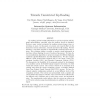55 search results - page 6 / 11 » Development of Neural Networks for Noise Reduction |
IJPRAI
2000
13 years 7 months ago
2000
Lip reading provides useful information in speech perception and language understanding, especially when the auditory speech is degraded. However, many current automatic lip readi...
JCNS
2007
13 years 7 months ago
2007
Neurons in vivo must process sensory information in the presence of significant noise. It is thus plausible to assume that neural systems have developed mechanisms to reduce this n...
NIPS
2001
13 years 9 months ago
2001
In the `missing data' approach to improving the robustness of automatic speech recognition to added noise, an initial process identifies spectraltemporal regions which are do...
SOCO
2008
Springer
13 years 7 months ago
2008
Springer
Attribute reduction of an information system is a key problem in rough set theory and its applications. Using computational intelligence (CI) tools to solve such problems has rece...
ICCAD
2009
IEEE
13 years 5 months ago
2009
IEEE
Decoupling capacitance (decap) is an efficient way to reduce transient noise in on-chip power supply networks. However, excessive decap may cause more leakage power, chip resource...

